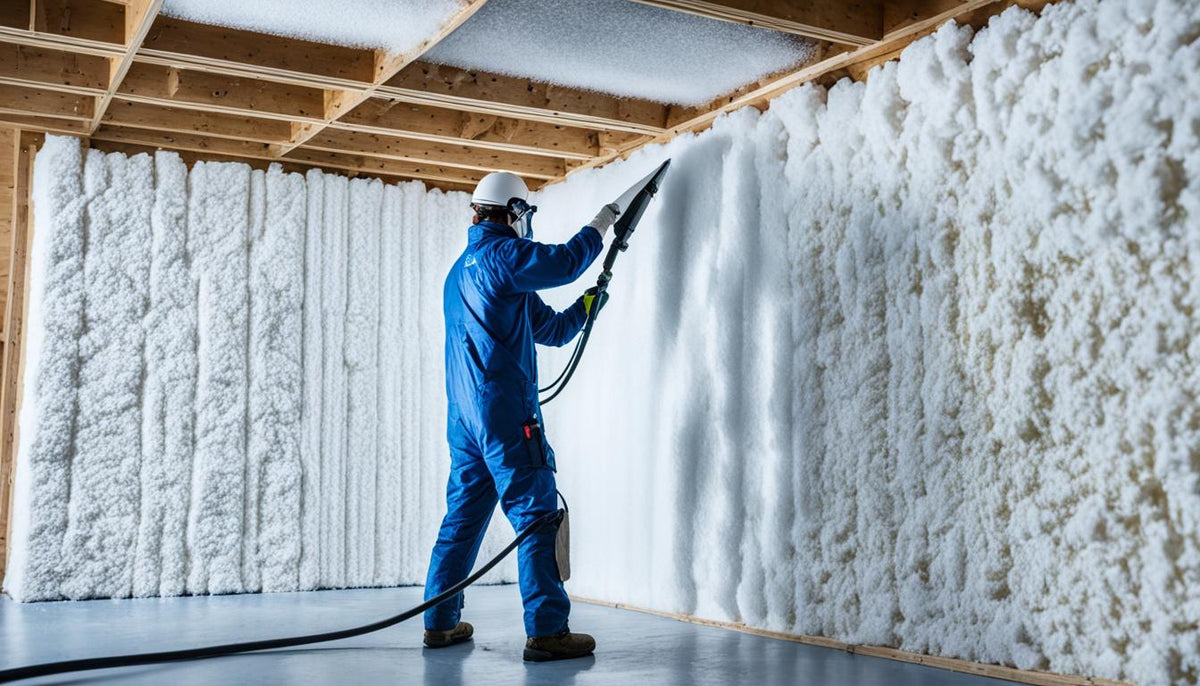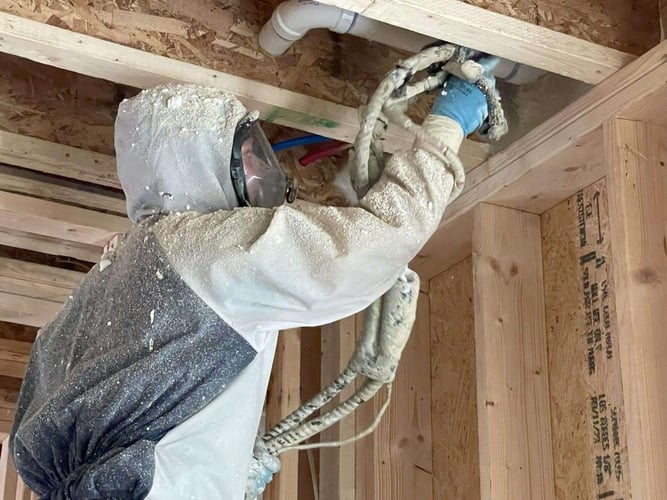Frequently Asked Questions Concerning Spray Foam Installation and Usage
Frequently Asked Questions Concerning Spray Foam Installation and Usage
Blog Article
Spray Foam: The Ultimate Service for Air Sealing and Insulation
Spray foam insulation has actually emerged as a leading solution for efficient air sealing and thermal insulation, supplying a special combination of properties that establish it apart from conventional approaches. Comprehending the complete scope of its advantages, installation procedures, and comparisons with other insulation kinds is important for making informed decisions.
What Is Spray Foam?
Spray foam is a functional insulation material that integrates the concepts of air sealing and thermal resistance to boost energy effectiveness in structures. Composed mostly of polyurethane or various other similar substances, spray foam is used as a liquid that broadens upon call with surface areas, creating a strong, continual layer of insulation. This distinct property allows it to fill up voids, cracks, and voids that conventional insulation products might overlook, offering a remarkable air seal.
There are 2 main kinds of spray foam: open-cell and closed-cell. Open-cell spray foam is lighter and a lot more adaptable, supplying excellent noise absorption and a reduced R-value per inch - Spray Foam. In comparison, closed-cell spray foam is denser, providing a higher R-value, moisture resistance, and added structural integrity to developing elements
The application process normally entails customized equipment, guaranteeing a seamless application that follows various substrates, consisting of steel, wood, and concrete. This flexibility makes spray foam appropriate for both new buildings and retrofitting existing structures. Its capability to produce an airtight barrier considerably adds to reducing energy consumption and boosting interior air high quality, thus making it a favored option among property owners and contractors alike.
Benefits of Spray Foam Insulation
Among the most considerable advantages of spray foam insulation is its remarkable capacity to produce a continuous air obstacle, which successfully lessens energy loss. Unlike typical insulation materials, spray foam expands to fill up gaps and splits, making certain that air leakage is significantly lowered. This characteristic not only improves power effectiveness yet likewise brings about reduce energy bills with time.
Additionally, spray foam insulation supplies superior thermal resistance, adding to a more steady interior environment. Its high R-value per inch permits reliable insulation in confined areas, making it ideal for attics, wall surfaces, and crawl spaces. Additionally, the moisture-resistant properties of spray foam assistance protect against mold and mildew and mold development, promoting healthier living conditions.
An additional crucial benefit of spray foam insulation is its sound-dampening high qualities (Spray Foam). It properly reduces noise transmission between spaces, producing a quieter and extra comfortable home environment. The sturdiness of spray foam likewise sticks out, as it does not droop or clear up with time, maintaining its performance throughout its life-span
Just How Spray Foam Works
Comprehending just how spray foam insulation functions is crucial for valuing its performance in air securing and thermal resistance. Spray foam insulation is composed of two key components: isocyanate and polyol material. When these components are mixed, they go through a chain reaction that creates the material to broaden rapidly, developing a dense foam that loads dental caries, spaces, and cracks.
As the foam increases, it sticks to surfaces, creating a closed seal that significantly lowers air seepage. This characteristic makes spray foam insulation very effective at preventing drafts and wetness penetration, which can lead to power loss and damage gradually. Additionally, the closed-cell version of spray foam provides superior thermal resistance because of its rigid structure, effectively lessening heat transfer.
The distinct residential or commercial properties of spray foam permit it to adapt to uneven surfaces, making sure comprehensive protection and a smooth barrier. Because of this, spray foam insulation not just enhances energy effectiveness yet likewise contributes to boosted indoor air quality by lowering the build-up of contaminants and allergens. Inevitably, recognizing the technicians behind spray foam underscores its function as a remarkable option for insulation and air sealing in both business and residential applications.
Installment Process Overview

Prior to installment, the area has to be properly cleaned and prepped, making certain that surfaces are totally free from dampness, particles, and dust. This action is vital due to the fact that pollutants can endanger attachment and general performance. When the location is prepared, the application includes mixing the 2 components of the spray foam, which expands upon call and loads voids efficiently.
Educated specialists ought to perform the installation, utilizing specific devices to make sure consistent protection and optimum density. Safety and security preventative measures, consisting of wearing protective gear and guaranteeing proper ventilation, are essential throughout this process. After application, the foam commonly cures promptly, forming article a solid barrier that enhances energy performance.
Contrasting Spray Foam to Traditional Insulation
When evaluating insulation choices, spray foam insulation stands out in contrast to standard materials such as fiberglass and cellulose. Unlike fiberglass and cellulose, which can enable air infiltration, spray foam expands upon application, filling up gaps and gaps to develop an airtight seal.
Furthermore, spray foam supplies a greater R-value per inch than traditional insulation types, providing even more efficient thermal resistance in a thinner account. This particular is particularly valuable in rooms with minimal tooth cavity deepness. Moreover, spray foam is check out this site resistant to wetness and mold growth, which can be a substantial interest in cellulose and fiberglass, especially in damp environments.
Nonetheless, spray foam insulation generally lugs a greater ahead of time cost than its traditional equivalents. Home owners need to weigh this initial financial investment versus lasting energy cost savings and performance advantages. Inevitably, while both insulation types serve their purpose, spray foam emerges as an advanced remedy for contemporary insulation requirements, especially in terms of air sealing and thermal efficiency.

Final Thought
In summary, spray foam insulation represents an extremely efficient remedy for achieving optimum air sealing and thermal resistance. Its distinct residential properties, consisting of moisture resistance and noise dampening, make it appropriate for different applications in both brand-new constructions and retrofitting tasks (Spray Foam). The initial costs may be higher contrasted to standard insulation materials, the long-term advantages, such as substantial energy financial savings and boosted indoor air high quality, warrant the investment and underscore its worth in contemporary structure practices.
Spray foam insulation has emerged as a leading service for effective air sealing and thermal insulation, using an unique combination of homes that establish it apart from standard methods.Spray foam is a versatile insulation product that integrates the principles of air securing and thermal resistance to boost power effectiveness in buildings.When evaluating insulation choices, spray foam insulation stands out in contrast to typical products such as fiberglass and cellulose. Inevitably, while both insulation types go now offer their purpose, spray foam arises as a more sophisticated solution for contemporary insulation requirements, specifically in terms of air sealing and thermal efficiency.
In summary, spray foam insulation represents a highly reliable remedy for achieving optimum air sealing and thermal resistance.
Report this page